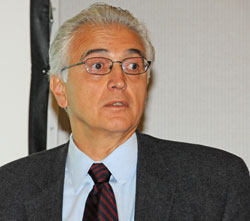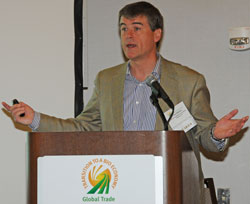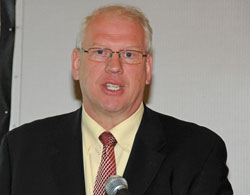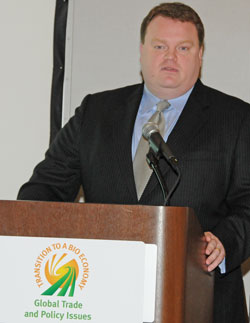Experts are expressing doubts the U.S. will meet targets for cellulosic ethanol production required under the Energy Independence and Security Act of 2007, but the need remains to make it happen as soon as possible.
 The legislation calls for the production of 4.3 billion gallons by 2015, but during a House Agriculture Subcommittee hearing this week, Dr. Howard Gruenspecht with the Energy Information Administration said, “It seems unlikely to us that you would get to those kind of levels by 2015, 2016.”
The legislation calls for the production of 4.3 billion gallons by 2015, but during a House Agriculture Subcommittee hearing this week, Dr. Howard Gruenspecht with the Energy Information Administration said, “It seems unlikely to us that you would get to those kind of levels by 2015, 2016.”
Gruenspecht says there are cellulosic ethanol plants opening up. “They will learn things from the initial plants and it will take some time for the standard to be developed,” he said. “It’s more complex than a corn ethanol plant.” He also noted that the industry needs additional funding for continued development.
Cellulosic ethanol company representatives were in Washington DC this week for the Biotechnology Industry Organization (BIO)‘s annual fly-in and one of their top issues in meeting with members of Congress and the administration was getting additional federal investment for advance biofuels. However, during a telephone press conference on Tuesday, BIO executive vice president Brent Erickson also admitted that the ambitious goals of the EISA for cellulosic ethanol will probably not be reached. “I think given the current economic turndown, the progress toward commercialization has slowed, and it is probably unlikely,” said Erickson in response to a reporter’s direct question as to whether the 2010 target for 100 million gallons of cellulosic ethanol will be met.
Still, the companies who are trying to make it happen remain optimistic about the future. “Given the long-term fundamentals for liquid fuels, the need is there,” said John Howe with Verenium. “This is not a discretionary activity. We have no choice but to pursue biofuels from cellulosics. We just need to do it the right way.”
Representatives from eight different advanced biofuels companies – Verenium, Aurora Biofuels, Abengoa Bioenergy, Gevo, DuPont Danisco Cellulosic Ethanol, Amyris, Mendel Biotechnology, Coskata, and Novozymes – all participated in this week’s fly-in and press conference.
 College students work best under pressure – so here’s your deadline to enter and win a MacBook Air laptop in the E85 Challenge – 11:59 pm EST April 3rd.
College students work best under pressure – so here’s your deadline to enter and win a MacBook Air laptop in the E85 Challenge – 11:59 pm EST April 3rd.

 Robert Friedland, President and CEO of
Robert Friedland, President and CEO of  Commercializing Gasification/Fermentation Technology was the topic of comments made by Mark Dietzen,
Commercializing Gasification/Fermentation Technology was the topic of comments made by Mark Dietzen,  I spoke with Paul Willems, BP Energy Biosciences Institute, one of our speakers at the Farm Foundation Transition To A Bio Economy Conference. I had met him previously at an earlier conference in the series.
I spoke with Paul Willems, BP Energy Biosciences Institute, one of our speakers at the Farm Foundation Transition To A Bio Economy Conference. I had met him previously at an earlier conference in the series. The legislation calls for the production of 4.3 billion gallons by 2015, but during a House Agriculture Subcommittee hearing this week, Dr. Howard Gruenspecht with the Energy Information Administration said, “It seems unlikely to us that you would get to those kind of levels by 2015, 2016.”
The legislation calls for the production of 4.3 billion gallons by 2015, but during a House Agriculture Subcommittee hearing this week, Dr. Howard Gruenspecht with the Energy Information Administration said, “It seems unlikely to us that you would get to those kind of levels by 2015, 2016.” In March, the European Commission imposed tariffs of 26 euros ($34.51) to 41 euros ($54.42) per 100 kg (220 lbs) on American biodiesel, virtually shutting the Yankee green fuel out of the European market.
In March, the European Commission imposed tariffs of 26 euros ($34.51) to 41 euros ($54.42) per 100 kg (220 lbs) on American biodiesel, virtually shutting the Yankee green fuel out of the European market. “The comments we have filed highlight that arbitrary procedural conclusions and inaccurate market assumptions were used by the EC as the basis for imposing provisional duties on U.S. biodiesel,” stated Manning Feraci, NBB’s Vice President for Federal Affairs. “The rationale used to impose AD and CVD duties – which clearly benefit the interests of European biodiesel producers – runs afoul of the EU’s WTO commitments.”
“The comments we have filed highlight that arbitrary procedural conclusions and inaccurate market assumptions were used by the EC as the basis for imposing provisional duties on U.S. biodiesel,” stated Manning Feraci, NBB’s Vice President for Federal Affairs. “The rationale used to impose AD and CVD duties – which clearly benefit the interests of European biodiesel producers – runs afoul of the EU’s WTO commitments.” Biofuels like ethanol and biodiesel weren’t the only energy alternatives on the program at the Farm Foundation Transition To A Bio Economy Conference. We also had a presentation on wind energy from Mark Willers, Minwind Energy.
Biofuels like ethanol and biodiesel weren’t the only energy alternatives on the program at the Farm Foundation Transition To A Bio Economy Conference. We also had a presentation on wind energy from Mark Willers, Minwind Energy. The
The  The legislative guru for the
The legislative guru for the